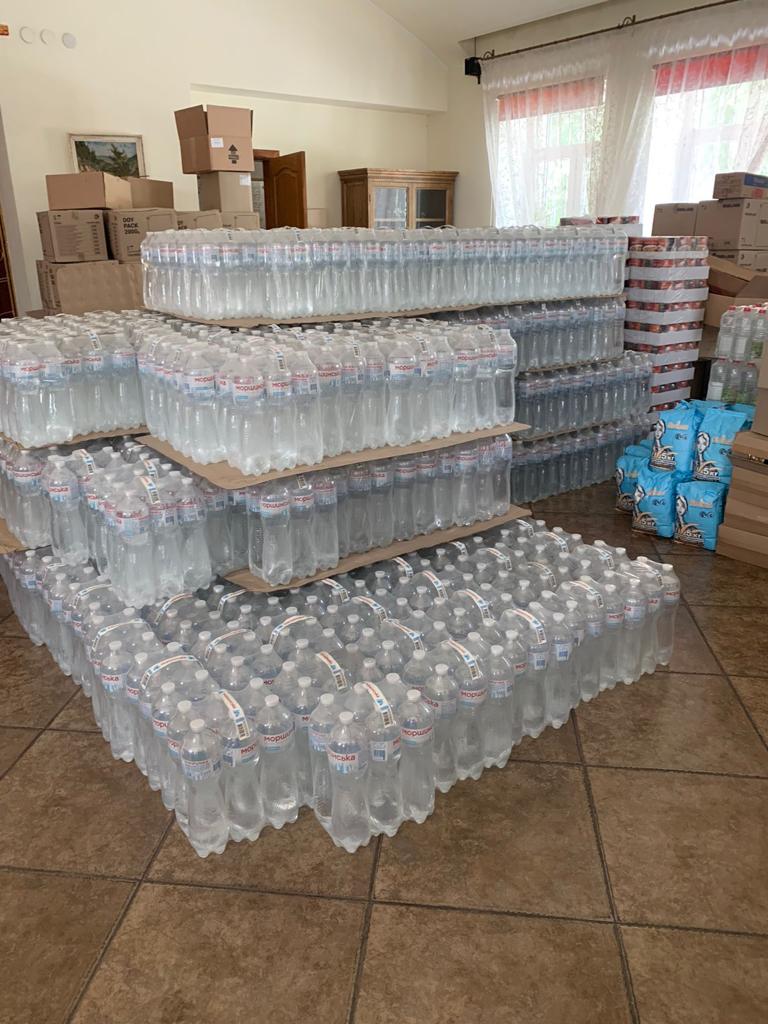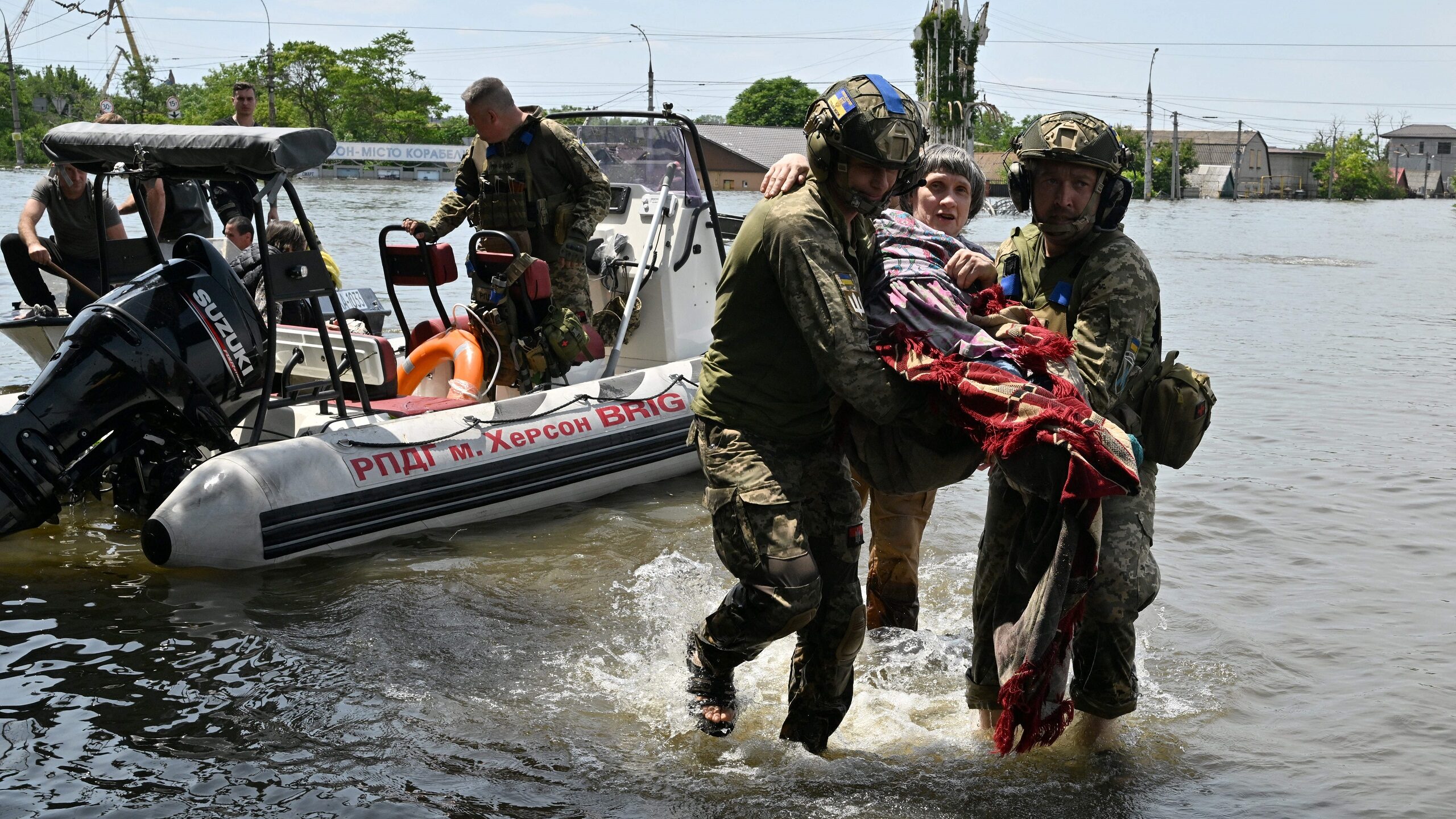War and Water at Center of Kherson’s Devastation as Jewish Community Dwindles
Still under daily artillery fire, residents now apprehensive about ecological impact after the flooding recedes
Before Russia’s invasion of Ukraine in February 2022, Ihor Papernyi owned a yacht club on the Dnipro River with a fleet of 60 to 80 boats. However, with the onset of the war, business ran dry and only a few of Papernyi’s boats survived the Russian takeover of Kherson. Now those few remaining boats are being put to use in the flooded streets of Kherson and surrounding towns, following a dam collapse on Tuesday.
“I’ve been using the boats to rescue people and animals. It’s not just me but the police, the army—everyone is out there working. People are still stuck on higher floors,” Papernyi told The Media Line in an interview on Thursday night. “There is a lot of wildlife that is running around the city too.”
The city of Kherson was already a ghost town, having lost some 80% of its population since the Russian invasion began. But following the explosion of the Nova Kakhovka Dam on Tuesday, subsequent flooding swallowed entire neighborhoods and forced the evacuation of residents, including the dwindling Jewish population.
Speaking from Kherson on Thursday, Chabad emissary Rabbi Yossef Wolff told The Media Line that the river rose again overnight, plunging more streets underwater and putting even more neighborhoods in jeopardy.
The flooded streets of Kherson. (Courtesy Ihor Papernyi)
“All of the places that are close to the river are underwater,” Wolff said. “The water level is up to the signs on the sidewalks—more than 3 meters [10 feet] at least.”
Wolff and Papernyi helped evacuate residents who lived closest to the explosion.
“We immediately contacted 20 families in the Jewish community that live near the water and got them out on Tuesday. Now we need to find them temporary housing,” Wolff explained. “Every person who lives in the area by the river will be out of their homes for at least two weeks when the water is expected to recede.”
Built in 1895, Kherson’s only synagogue is situated some 20 meters above the river’s level and will likely remain out of reach of the flood waters. Since the war began, the synagogue has been a focal point for providing food, water, and other essentials including electricity and internet connection when the power went out in other areas of the city.
We are the address for everybody. Everyone in the city knows they will not be kicked out from the synagogue, and they are coming here for help.
While the main focus of Chabad is to provide for the Jewish residents, the community has welcomed anyone—and many have turned up.
“We are the address for everybody. Everyone in the city knows they will not be kicked out from the synagogue, and they are coming here for help,” Wolff said. “I’m not a military man, I’m here as a rabbi. We didn’t close up the synagogue even for one day.”
Kherson, a key port city on the Black Sea, was temporarily occupied by Russia from March through November 2022 when it was recaptured by Ukrainian troops. But despite its liberation, the city has not been safe.
“We are still under bombing every day,” Wolff said.
The Jewish community in Kherson was established when Jews were permitted to settle in the southern Ukrainian city on the Black Sea in the late 1700s. Before the Ukraine-Russia war which began in February 2022, there were an estimated 10,000 Jews, according to Wolff. A general exodus of residents since then has left the Jewish community at barely 1,000 while the overall population has decreased from 350,000 to about 60,000.
Humanitarian aid organizations, including Jewish groups such as IsraAID, the American Jewish Joint Distribution Committee, and Chabad, are delivering food, medicine, and basic goods to the city.

Supplies have been distributed from the Kherson synagogue since the beginning of the war in February 2022. (Courtesy Chabad)
The Jewish Agency in Israel said it is closely monitoring developments and “is in contact with the community and its leaders, as well as with other leaders in the area.”
“As of now, the Jewish community is being assisted by the rescue teams on the ground and are receiving the help they need,” the Agency said in a statement to The Media Line.
The Jewish Relief Network Ukraine estimated that this week, at least 2,000 homes flooded and 20,000 buildings have lost power. Authorities estimate that the flooding could ultimately impact up to 40,000 people in 80 towns.
For now, residents have enough food, water, and other supplies, Papernyi said. Their primary concern is what they will find once the water recedes, which ironically could be more damaging than the war itself.
“What has happened to the farms, businesses, chemical plants, gas plants? What kind of air quality will we have? Water quality? Diseases? All of this plus war. Residents are more worried about the ecological impact than the war at the moment,” he said.
Ukraine’s President Volodymyr Zelenskyy, who visited Kherson on Thursday, called the explosion “the largest man-made environmental disaster in Europe in decades.”
Similar concerns are rampant on the Russian-occupied side of the river, where a nuclear power plant received its cooling water from the river. Last year, Zelenskyy accused Russia of placing mines on the dam when they occupied the city, which may have lent to the force of the explosion.
However, it isn’t clear what either side would gain from collapsing the dam.
In official statements, Israeli officials steered clear of blaming Russia.
“Such deliberate targeting of critical infrastructure and people must be strongly condemned by the entire international community. Our thoughts and prayers are with the Ukrainian people in this difficult hour,” Lior Haiat, spokesperson for the Foreign Ministry, said in a press release.
It’s a year and a half of tragedy. We thought it was just war, but now we see there are no limits. What’s next? Nuclear?
Papernyi, 52, lived in Israel from 2000 to 2007 when he returned to Kherson for business.
Asked whether he would consider returning now, his answer was simple: He can’t. Ukrainian men ages 18 to 60 are banned from leaving Ukraine due to the war.
And while he isn’t worried that the Russian army will take advantage of the city’s vulnerability after the flood, as the waters also pushed back their troops, Papernyi didn’t imagine his country would be in the throes of war for this long.
“It’s a year and a half of tragedy,” he lamented. “We thought it was just war, but now we see there are no limits. What’s next? Nuclear?”


